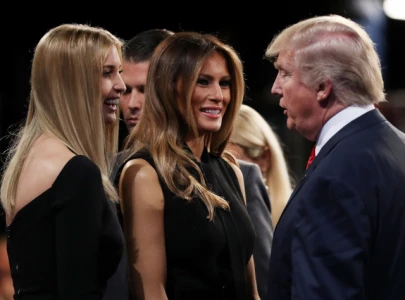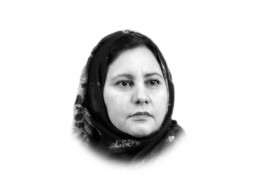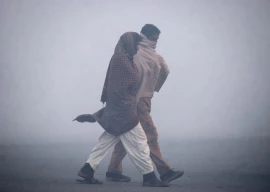
The abrupt creation of the National Security Council (NSC), something that Sharif had vehemently opposed in the past, demonstrates how both the political and military elite in Pakistan are now on board together when it comes to mending the historical fractures that have been the hallmark of relations between the two neighbours. The civil-military institutional bonding at this stage, it seems, is designed to create an impression that both the civilian and the military elite realise the importance of embracing a renewed security agenda and response, without implementing which the credibility of pursuing peace as an instrument of policy will largely remain doubtful. Regardless of how the civil-military nexus collaborates, at least by formulating the NSC, the government has tactically agreed to provide a joint civil-military platform to institutionalise our security response. This is something that has not happened before and is also something that India will be watching closely.
The reality is that India, unlike Pakistan, is under no compulsion to speed up the dialogue process. While the Pakistani government and the military may realise now that we suffer because we left our security problems unaddressed for too long, there seems to be no immediate Indian insecurities that an early resumption of a peace dialogue with Pakistan may address. However, what India needs to carefully review is that resumption of an India-Pakistan peace dialogue will have a direct bearing on how Pakistan handles its insecurities on the western border. The likely unpleasant developments in Afghanistan after the Isaf’s drawdown is completed can be best handled if Pakistan and India agree on certain security commitments on the eastern front. This will give the necessary leverage to our political and military leadership to eradicate militancy, with manpower and resources spared from the eastern front. Otherwise, if militancy spirals out of control, then not only Pakistan, but the entire region will experience its negative fallout.
Viewed realistically, India will wait and see what constitutes our much-awaited national security policy. It will like to first see the emerging picture of transition and only when this transition takes the shape of reality, it may finally agree to a meaningful peace dialogue. As of now, Sharif’s good intentions of moving the dialogue process forward, is viewed by India only as a compulsory preference and not a policy. Until we make some tough strategic choices essential to our security, India will not view with seriousness the offer of dialogue. So, it is not a matter of reaching out to India but a matter of reaching in to implement the much-needed security reforms essential to fight terrorism and maintain order across Pakistan. Given India’s past experience, Sharif will continue to be reminded on how Kargil stood out as a black mark against his peace-seeking government during his previous tenure. One cannot blame India when it waits and sees how Pakistan’s deeply-entrenched institutions act this time around. Bringing militancy under control will be a long-drawn process. The future of our relationship with India will rely on how best we are able to meet this threat at home. Only after we have done our homework and done it well, will our desire of peace might finally take the shape of reality. It will take some doing and for all those, including our prime minister, who are in a hurry to see the two neighbours getting together soon to sort out their problems, I can only say: not so soon; not before we have done our homework.
Published in The Express Tribune, August30th, 2013.
Like Opinion & Editorial on Facebook, follow @ETOpEd on Twitter to receive all updates on all our daily pieces.
COMMENTS (29)
Comments are moderated and generally will be posted if they are on-topic and not abusive.
For more information, please see our Comments FAQ

1726117332-0/Megan-Thee-Stallion-(1)1726117332-0-165x106.webp)

















Pakistan's military is losing it's two favorite excuses for failing to control militancy. Many Pakistani's no longer believe that the militants are going to drop their weapons and embrace Islamabad when the American's depart Afghanistan and few believe lack of "consensus" is a realistic/viable reason for not tackling militancy. In short - Pakistan's military's credibility is under scrutiny which has forced it to change it's public posture. . To compound the problem - Pakistan's military has upset the American's who can no longer be relied on to continue high tech weapon sales and what weapons the Chinese have are only available if you have the hard currency (something increasing difficult to find when your broke and already spending too much on the military). . And the biggest challenge faced by Pakistan - lack of credibility. NO ONE trust anything you say - not the Taliban, American's, NATO, Afghan's, Chinese, Iranians etc.... So any public change in policy is met with skepticism. Nobody is going to risk anything based on promises by Pakistan - which means your going to have to be the first to lower your guard and extend the hand of friendship.
@suraj bhia, Tax or jazzia were wave with in first years of empire and there was some bad stuff do happend but mughals were very libral in reliegen and most of the missionery work done by muslims saints or peer walis and its a true history and even written by many hindu historians and i guess that was a reason muslims spare in india today.
@Naveen India is better than china in freedom of reliegen.
@Naveen I agreed and Sheikh Mohd Iqbal was right indeed.
@Ali Tanoli: Last time BJP was a party in power who start it peace process with Mian Nawaz sharif
Who stabbed Bajpai in the back (by playing Kargil) when he went to Lahore to talk to Mian Nawaz Sharif?
Pakistan is again playing Kargil at LOC and killing soldiers. I have seen videos at timesof india website showing Pakistanis infiltrating into India at night in recent days.
@Ali Tanoli: Bro forgot to mention lot of things..like Invasions, Forcible conversions, Taxes based on Religion, Harappa Mohonzodoro civilization (courtesy Arabs) etc..
@Naveen: Continuity and cohesiveness than India has? The Chinese? Now I know you know nothing about the Chinese. . India's strength has always been her diversity. A diversity of opinions, of people, of faith. People such as Bhaskara I & II were able to live distant from squabbles and make some of the earliest discoveries in Mathematics. Long before the USA, we respected other races, religions and opinions.
It is unfair to block critical comments when everybody is praising the article. Do we have NO right to a second opinion? Is the author beyond criticism?
@Ali Tanoli: You forgot reminding him that the line he's quoting (about uniqueness of Indian civilisation) are the ones by none other than a Muslim - Muhammad Iqbal from his famous poem 'Saare Jahaan se Achha' - that remains to this day the defacto national song of India (particularly in the Northern & Central hindi belt).
As a rationalist however, I think there's a lot of exaggeration there. Not just in the how far there is a continuity in India from ancient times but also in the fact that there is a great Civilisation that has shown a lot more continuity & cohesiveness than Indians have, since Ancient times (atleast since bronze age) - The Chinese.
@Modified, Islam did gave great things to India first great civilization, then Pakistan, Bengladesha, Kashmir Muslims, and 20% of india population and food and culture of ADAAB respect, monuments, name Hind. what else u wanna know?
@moderator, put two comments, which I don't think was out of the subject and also was not offensive to anybody, still not printed. if u put out some guidelines will be helpful or just could say not recomended in your space and hide, only people who want to see can see after a click. still, in simple words below is the gist of it India would be THE BEST FRIEND of Pakistan if only pakistan stops terror eminating from its soil in all forms.
The future of our relationship with India will rely on how best we are able to meet this threat at home. Only after we have done our homework and done it well, will our desire of peace might finally take the shape of reality.
When I say the same exact thing it gets blocked by moderators but this is the crux for those looking for a solution.
"Bringing militancy under control will be a long-drawn process", the author has admitted. It would be better still to say that the civilian government needs to bring not only militancy but also the military under control (the latter never happening in Pakistan in its entire existence), if real democracy has to take root.
One of the very few sensible and well researched articles I have ever seen in a pakistani newspapers. It is not just India, but the whole world expects from pakistan to have a coherent counter terrorism policy that includes India specific elements. Otherwise as the author says, if militancy spirals out of control, then not only pakistan, but the entire region will experience its negative fallout.
Many thanks
Its a relief to see such articles.
Sanity at last! Good job ET!
Excellent write up..kudos to the author.
Bingo ! Invest in peace; only then you will enjoy the dividend. Very well written, Mr Author.
Very nicely said and hope Pak Govt will show some solid results in their homeland by controlling terror outlets.
The author has been very honest about this appraisal. Let the hawks on both sides take a little chill pill and wait for some improvement in the military atmosphere. However, Mr NS's suggestion of 'no arms race' though is a noble idea but it is a non starter because India is not only looking at Pakistan but the wider world and potential dangers involved.
Bravo - what a relief to read this article.
A sensible approach indeed, but would India ever show any seriousness to clinch the substance.! So far it looks like India wishes to keep the kettle boiling . It is more helpful in playing to the home gallery than showing seriousness to address the basic issues between the two countries. Not to talk of Siachin or sir creek even the circa of strayed fisherman doesn't fit in the agenda
Author: Kudos to you for a realistic analysis. Once the policy situation in Pakistan becomes clear - i.e. is military on-board; and how much - both governments can engage more effectively. Infact, both the countries also need to enter into a tripartite engagement with Afghanistan - thrashing out each others concerns, with Afghan sovereignty in mind.
Sensible indeed.
Last time BJP was a party in power who start it peace process with Mian Nawaz sharif and i think this time again its gonna be BJP who will restart process unfinished by Vajpai and few good peoples in bjp made honest comments about pakistan like L.K Advani about Quaid azam, and Mr jaswant singh book about pakistan. and i guess congressi will never gonna do something revolutionery they are double head snacks who divided india.
@Author Sir, a very realistic picture and a very pragmatic advice by you.
Sad, but precise elaboration of the political situation in India and Pakistan. It is tragic that handful of people( read those encouraging hatred) controls the lives of billion plus common men who has no interest in conflict and would love to live a content life where he / she can earn the livelihood and take care of family and friends. I am eagerly looking fwd for this peace process to go forward. Not just the elected leaders but I would say even the army should do more candid meetup for long lasting peace.
After a long time there is something sensible on India-Pakistan relationship. Let us wish all the success to Mr Nawaz Sharif. Let us hope Jihadi brigade is dismantled soon in Pakistan. Time to sensor people like Hafiz Saeed ,whom India thinks, enjoys Pakistani government's patronage. Every sensible Pakistani knows that all indo-Pak wars were started by Pakistan. Trouble in Kashmir is a creation of Pakistan. Might be Pakistan is like a tiger. However, India is also like an elephant and simply doesn't care about tiger or lion and can afford to walk carefree. Pakistanis should not forget that they were our part and we have lived and dealt with them for 1000s of years pre and post Islam. Don't you think there is something in India which is unique and that's why she survived Islamic onslaughts unlike Persia and Egypt who were ran over within 20-30 years ? Is there any other civilization in the world which has survived this long? Don't you think, even Pakistanis should be proud of India as former Indians?